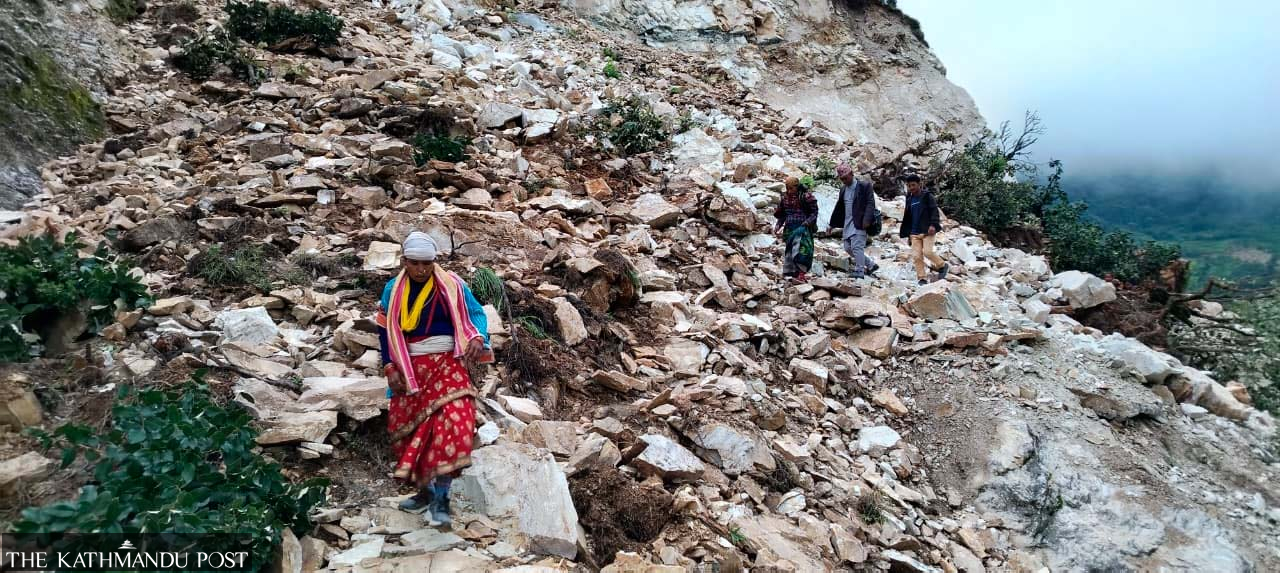
A Perilous Journey Through Neglect
In the remote region of Bajura, a mere 42 kilometers between Martadi and Kolti has become a test of endurance. What should be a simple trip stretches into a full-day ordeal, with passengers changing vehicles up to six times. Along the way, they navigate landslides, cross rivers on makeshift bridges, and pay exorbitant fares of up to Rs2,000 for a one-way journey.
The road is in a deplorable state, riddled with landslides and unfinished sections. No single vehicle can complete the entire route from Martadi to Kolti. Passengers begin their journey by taking a vehicle to Bahuli Khola, then walk to Anai Khola to board another. From there, they ride to Jilli, switch again at Rajatoli after crossing a landslide, take a jeep to Bhasupatal, and then another to Dansanghu. Finally, they cross a suspension bridge over the Baddigad stream to reach Kolti on a sixth vehicle.
Dambar Bohara, a local farmer, expressed his frustration: "To cover 42 kilometers in our own district, we have to spend a whole day and change six jeeps. It's not a road, it's a punishment." He criticized the authorities for ignoring the people’s hardships.
Jeep operators capitalize on the poor road conditions, charging high fares. Manoj Bohara, an employee at a ticket counter in Martadi, explained that from Anai Khola to Dansanghu, they charge Rs1,000. Additional fees of Rs500 are added for jeeps running from Martadi to Bahuli and from Dansanghu to Kolti. This cost burden falls heaviest on villagers who already struggle with low incomes.
The situation worsens during major Hindu festivals like Dashain and Tihar, when travel demand surges. Residents from neighboring districts such as Humla, Mugu, and Kalikot also rely on the Martadi-Kolti road, meaning the broken route affects more than just Bajura.
Bajura, ranked at the bottom of the Human Development Index, has long faced poor connectivity. Amar Bahadur Khadka, mayor of Badimalika Municipality, questioned the development efforts: "If you cannot even take patients to the hospital in an ambulance because the road is broken, what development are we talking about?"
The deteriorating road reflects broader issues in Nepal's infrastructure projects—delays, negligence, and lack of accountability. The construction contract for upgrading the Martadi-Kolti-Piluchaur section was awarded to Baniya-Kusheshwar JV, a company linked to Indra Baniya, a Nepali Congress leader and current chief minister of Bagmati Province. Despite securing contracts worth over Rs622 million, the company has repeatedly missed deadlines.
Devi Upadhyaya, an engineer at the Sanfebagar-based Infrastructure Development Office, stated that the contractor has been granted extensions four times but has failed to deliver. "We signed the contract in 2019, but even after repeated deadline extensions, the work remains incomplete. Letters have been sent dozens of times, but nothing happens. The only thing that gets extended is the deadline."
A package from Chuthi to Dhamkane, a five-kilometer stretch, was supposed to be completed by mid-2021. Another package covering 26 kilometers from Dhamkane to Kolti was to be finished by mid-2023. Both remain unfinished, and the company has received a new extension until July 2027. Rishiraj Baniya, the project representative, declined to comment on the delays.
Frustration among locals is growing. Janak Kumar Bohara, mayor of Budhinanda Municipality, remarked, "Another contractor, working on the first 9 kilometers up to Chuthi, completed the work within the deadline. That proves it's possible when there is willpower. But here, it is deliberate negligence. We've been left stranded."
Road projects across the country often go to politically connected contractors who abandon work midway, leaving communities in hardship. The Martadi-Kolti road has become a glaring example of this systemic failure.
For residents, the consequences extend beyond inconvenience. The northeast of Bajura and adjoining districts depend on this road for access to hospitals, schools, and markets. When landslides block the road, patients cannot be transported to Martadi for treatment. A local from Kolti said, "This is not just about transport. It is about life and death for us. If someone falls seriously ill, they may not survive the journey."
Officials claim they will attempt to repair sections before Dashain to allow jeeps to pass. Engineer Upadhyaya said, "We are planning to clear small landslides and carry out maintenance so that travel can resume during the festival season." However, locals remain skeptical about these promises.
Until accountability is enforced and contractors are compelled to deliver, the Martadi-Kolti road will remain a symbol of neglect, leaving thousands of villagers stranded in their own homeland.

0 Comments